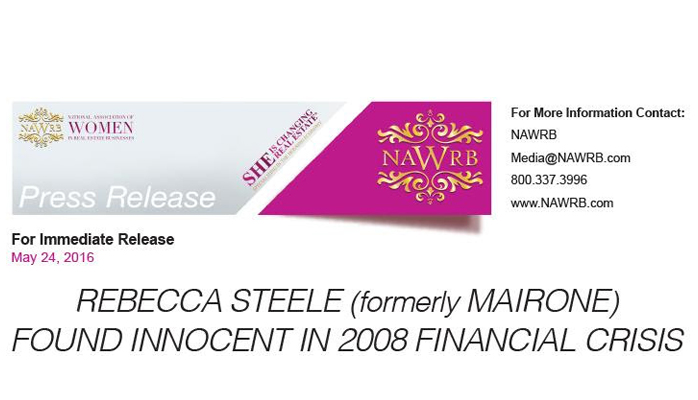Memorial Day is a holiday occurring on the last Monday of May that honors the women and men who have died serving in the U.S. military. Originally called Decoration Day in the years following the American Civil War, Memorial Day was officially recognized as a federal holiday in 1971. Americans commemorate today by attending memorials and cemeteries, holding parades and hosting family barbecues.

Know an Incredible Woman Preserving the
Quality of Life During COVID-19?
Submit your story today!
Read More

Consulting & Branding Opportunities
Grant your business access to insider,
proven knowledge to improve the quality of your procured
services and maximize business performance.

If you need D&I
Contact Us!
A Team Focused on Bring Diversity and Inclusion to Every Level
Learn More

#1 Top Real Estate Influencer
Desiree Patno
Diversity & Inclusion, Quality of Life, Know the Rules of the Game ®
Your Next Event
Grow Your Business
NAWRB: An SBA Resource
NAWRB is listed as a women-owned business resource for the SBA.
Check It Out
NAWRB Aging Population
Help Protect Elders
from Financial Abuse
Over $36.5 billion a year is lost annually in the U.S.
Prevent Financial Abuse

Women's Homeownership:
Dream. Stability. Sanctuary.
Life often presents us
with unplanned disruptions.

AI Technology
with
a Human Touch
Is
The Perfect Balance


NAWRB Women's Global Resource Center
A women’s depository for vendors & clients to grow their diverse spend & increase women’s employment at all levels within the housing ecosystem.

Monthly Archives: May 2016
The American Rental Market: Will there be a Change in Affordability?
Exponential Growth in Rental Housing Demand
As of mid-2015, 43 million Americans lived in rental housing; representing an increase of almost 9 million since 2005. This raised the number of all American renter households from 31 to 37 percent, the highest it has been since 1960.
The Great Recession brought with it almost 8 million foreclosures, a drop in average household incomes, hiked rents and stringent access to mortgage credit deeming homeownership exceedingly challenging. Even though rents are soaring, people still choose to rent as it affords them more flexibility in financial commitments and does not involve the extra burden of property maintenance which can make a big dent on paychecks.
Continue reading →
Strengthening the Women’s Culture
What a profound statement! It is with the same fervor as Madeleine Albright that NAWRB supports other women. Like the first female U.S. Secretary of State, we believe that other women, organizations, companies in the public and private sectors and the government must follow suit. As the Diversity and Inclusion (D&I) movement continues working for equal access to resources, equal representation, equal pay—the list goes on—it is crucial to create unwavering unity among women to advance women’s culture. If this culture is not strengthened, with the many problems burdening women, women will remain too scattered to be truly heard in unison and inspire more commitment from the rest of the country. As we continue working to get this right, there must be adjustments within women’s culture and leadership mindsets to achieve greater growth.
Women’s Homeownership Initiative (WHI)
Homeownership is a central part of the American dream, for most people, it is the American Dream. Owning a home connotes success and achievement.
As women progress in the workforce and receive the consideration and participation they have earned, it is essential to fortify their growth with strong economic foundations. Why is it important for women to become homeowners? Homeownership provides the financial security to safeguard women’s progress, and paves the way for future generations.
Women continue to face obstacles in their career paths, with a pervasive 27 percent gender wage gap and lack of advancement in hierarchy. This disparity significantly impacts women’s ability to incur savings and secure a home to call their own, as their paychecks don’t travel nearly as far as men’s.
Continue reading →
Growing Your Business to Include an Affluent Global Clientele
Is part of your 2016 business plan to attract a more global, affluent clientele? The world is getting smaller and smaller, particularly for those with means who are even more world-wise than previous generations. Therefore, growing your business to target, attract and retain this appealing demographic makes sense. However, it’s not for everyone. Attracting affluent patrons outside of your market can be expensive and difficult, yet extremely lucrative. According to the National Association of Realtors (NAR), foreigners pay on average nearly $500,000 for a house, compared to the national average of $256,000. As you think about expanding your business, knowing how to navigate this world and heeding a few key pieces of advice can make all the difference between notable success and spectacular failure.
Continue reading →
Helping Hand for Homebuyers with Bad Credit
A newly introduced bill could significantly alter the way Americans’ credit data is stored, reported and utilized by credit reporting agencies. Yesterday, Representative Maxine Waters, D-CA, introduced the “Comprehensive Consumer Credit Reporting Reform Act of 2016” which aims to transform the American credit reporting system in an attempt to make it “fairer, more accurate, and less confusing for consumers.”
Rebecca Steele (formerly Mairone) Found Innocent in 2008 Financial Crisis

You would be hard-pressed to find a person who was not affected by the 2008 Housing Bubble. Millions of Americans watched their homes and life savings fall through their fingers, able to do nothing about it. With its rising mortgages, fluctuating home values and rampant foreclosures, the housing crisis stemmed from a long line of erroneous financial circumstances and was the leading cause of the 2007 American recession.
Despite the fact that the housing bubble’s causers and causes are vast and various-from mortgage bankers, underwriters, low short-term interest rates, negligent mortgage guidelines, investment banks and even homebuyers themselves-only one individual was found liable for their part in the 2008 financial crisis. Rebecca Steele.
Steele’s indictment was set in motion with the federal government’s case against Bank of America’s Countrywide for their issuance of unstable mortgages prior to the financial crisis; the accusation came with an additional $1.27 billion penalty for Bank of America. Edward O’Donnell, the whistleblower who received $57 million for his role in exposing the case, and was expected to earn an additional $1.6 million reward upon the case’s conclusion, pointed the finger at Steele, the only woman in senior management at Countrywide.
DOL Helps Overtime Workers, Hurts Small Businesses
Last year, the Department of Labor (DOL) issued a Notice of Proposed Rulemaking (NPRM) focused on increasing the overtime eligibility for millions of Americans currently classified as exempt workers. With the proposed rule, the salary threshold for employees eligible for overtime pay would change from $23,660 to $50,440 in 2016 and be updated every year.
The Herbert H. Landy Insurance Agency, Inc.
John Torvi from The Herbert H. Landy Insurance Agency, Inc. will be discussing current issues and five important insurance tips for all professionals in the housing industry.
Marcia Wieder
Marcia Wieder, CEO/Founder of Dream University & Wall Street Journal Best Selling Author ofDREAM: Clarify & Create What you Want, will be discussing the three powerful yet simple steps to dream bigger, live healthier lives, and design the next phase of your life.

 Login
Login













